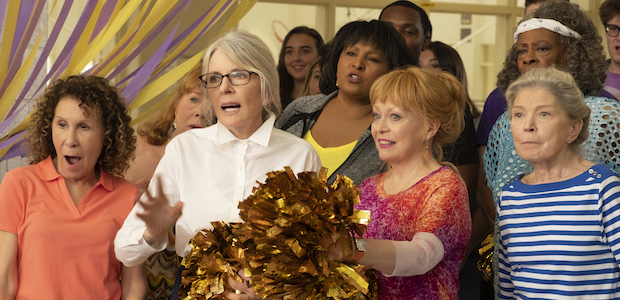Zara Hayes’ Poms is a film made with admirable intentions. It’s not exactly a secret that older women rarely get opportunities to be prominently featured in big studio features, and this is a movie that not only puts together an ensemble featuring some of the best veteran actresses in the business, but constructs a plot that is all about the unfair perception of their demographic. In that respect, it is most definitely relevant and timely, and it should be celebrated for that approach. What’s unfortunate, however, is that it doesn’t really do much to stand out beyond those core principles, nor does it properly take advantage of the talent involved.
Based on an original screenplay by Shane Atkinson, the story centers on Martha (Diane Keaton), a single woman with no children who makes the decision to move into a retirement community following a terminal cancer diagnosis. Initially she is content to spend her remaining days in isolation, perpetually cynical about making new friends and the various local communal events, but it’s thanks to the influence of her outgoing, sex-positive neighbor Sheryl (Jackie Weaver) that her philosophy begins to change.
Although she initially bridles at the idea of joining one of Sun Spring’s many clubs, Martha is convinced by Sheryl to go after an unfulfilled dream from her childhood and start her own cheerleading group. It’s an idea rejected by the community at first, particularly the big woman on campus, Vicki (Celia Weston), but the two women don’t let concerns about insurance or lack of interest get them down. Following a bit of recruiting, Martha and Sheryl are able to put a team together – including characters played by actresses Pam Grier, Rhea Perlman, Carol Sutton, Phyllis Somerville, Patricia French and Ginny MacColl – but that’s only the first hurdle. They not only have to create a routine in preparation for the forthcoming Senior Showcase, but also convince basically everyone to take them seriously.
This is a summation of Poms’ first 30 minutes, and if you’ve ever seen a film before you can probably do a pretty accurate job speculating what occurs in the hour that follows. As unconventional as it is to see a mainstream film with an ensemble of actresses over 65 years old, it’s as conventional as it can be in basically every other respect. There is hardly a single underdog sports movie cliché that isn’t employed at some point, and it’s difficult to feel entirely engaged with the story when you know exactly how every single scene is going to begin and end.
What only accentuates this disappointing aspect of the movie is the fact that you can plainly see opportunities that are left on the table, most notably with the tone. In short, it fails to embrace the very real potential for dark comedy and edginess into which it occasionally dips, and one is left wondering what it could have been if it had decided to try and pursue an R-rating. There are certain bits set up that have real potential to be funny – such as the notion that Rhea Perlman’s character killed her overbearing, caveman-thinking husband so that she could join the squad – but too often it feels like Poms is afraid of offending audiences’ potentially sensitive sensibilities (which honestly feels counter to its big picture message).
Adding to the disappointment is the fact that the movie doesn’t really seem to know what to do with its large ensemble – to the point where it basically stops trying. Perhaps the only trope that’s not employed by the film is giving each member of the squad a special skill that helps them stand out from the rest of the pack, and the result is that the parts other than Martha and Sheryl basically all blend together. It’s both surprising and terribly unfortunate just how little Pam Grier is given to do in the script, accentuated by the fact that her character’s name isn’t even mentioned until shockingly late in the runtime.
I went into my screening of Poms with the most open of minds – recognizing that the film would potentially suffer the same struggle as its characters in the minds of other critics and not be taken seriously simply because of its logline about senior citizen cheerleaders. Even accepting the approach at face value, though, I was still left disappointed. There is a lot more that could have been done with this story and the awesome talent involved, and it’s unfortunate that it ultimately comes up short.

Eric Eisenberg is the Assistant Managing Editor at CinemaBlend. After graduating Boston University and earning a bachelor’s degree in journalism, he took a part-time job as a staff writer for CinemaBlend, and after six months was offered the opportunity to move to Los Angeles and take on a newly created West Coast Editor position. Over a decade later, he's continuing to advance his interests and expertise. In addition to conducting filmmaker interviews and contributing to the news and feature content of the site, Eric also oversees the Movie Reviews section, writes the the weekend box office report (published Sundays), and is the site's resident Stephen King expert. He has two King-related columns.











